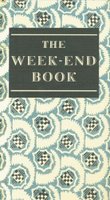 This great review from the Wall Street Journal not only features such Scrabble-worthy vocabulary words as "boskiness," "genteelery," "besotted," and "tishy-toshy," but it is also the first use of "TGIF" in a headline of a review of THE WEEK-END BOOK.
This great review from the Wall Street Journal not only features such Scrabble-worthy vocabulary words as "boskiness," "genteelery," "besotted," and "tishy-toshy," but it is also the first use of "TGIF" in a headline of a review of THE WEEK-END BOOK. As a publicist, one tends to keep track of that sort of thing.
TGIF, Circa 1924: Then as Now, Get Out of Town--John Mark
By KENT OWEN
THE WALL STREET JOURNAL
IN THE 1920s, leisure was still a relatively new feature of life in the industrialized world and the spacious two-day “week-end” of socially obligatory relaxation still something of a novelty. But Francis Meynell, a British book designer and publisher, recognized early on an impulse that survives to this day: the urge to go out into the countryside and immerse oneself in the enchantments of nature, as far away as possible from urban annoyances.
In June 1924, a year after Meynell founded the Nonesuch Press—with his wife, Vera, and friend David Garnett—he brought out “The Week-End Book,” a handbook that, among much else, tutors the rural explorer (on foot, of course) in wildflowers, beasts of the field, birds, geological formations, crops, trees and stars.
Edited by Meynell with the help of his wife, “The Week-End Book” was an immediate success and was revised and updated periodically until its last edition, in 1955 (the current version is a sort of greatest-hits package.) Readers discovered to their evident delight that the book offered an abundance of diversions and useful observations. Some readers may have especially liked its sensible approach to enjoying the great outdoors: “We must beware of prophesying woe to those who ‘interfere with the balance of nature’ because ‘the balance of nature’ is a meaningless phrase. What we really imply by it is the arrangement which best suits ourselves; for every operation on the farm interferes with ‘Nature’ to a certain extent and if ‘Nature’ is left to herself in England the land returns, as we have seen, to light forest and scrub.”
For all its boskiness, “The Week-End Book” doesn’t forsake those who would rather take their pleasures away from sunlight and insects. The chapter on games includes both the outdoor and the indoor kind, the active and “the quieter.” It begins with a fetching epigraph, from British writer Stephen Potter’s sports-humor book “Gamesmanship” (1947), advising lesser tennis players to dress as if they’ve never played before, so that if they actually win a point, it will have a demoralizing effect on the opposition: “If you can’t volley, wear velvet socks.”
About a game called rounders (a cousin of baseball), “The Week-End Book” notes: “This is a good game, in spite of the quarrels which it engenders amongst those who do not study the observations following.” What follows are, essentially, the rules of the game. (“The runner must go unmolested to his nearest base.”) The book lays out the rules of other games as well—none of them, one suspects, to be adapted for PlayStation anytime soon. These include tierce, gallows, tishy-toshy, and Up-Jenkyns!, which seems to combine Simon Says with hide-and-seek.
When the competitive spirit wanes, other activitites may occupy the weekend hours: Meynell offers songs, recipes and drinks, first aid, law, etiquette and poems (some well-known, others—such as “New Countryman” by one Francis Meynell—less so). Under the etiquette rubric is a list of driving manners written by Paul Gallico, one of the few Americans to make Meynell’s quotable A-list: “There’s nothing wrong with women drivers. The trouble goes much further back to their being women. You’ll never fix that.”
Though “The Week-End Book” was originally edited for earlier British generations, latter-day readers needn’t be besotted with Anglophilia or quaint genteelery to find it to their liking. The prose is engaging, ambling and droll, and the topics covered reflect a clear-eyed curiosity trained on all sorts of stuff worth knowing. It could well be that “The Week-End Book” owes its staying power more to its quick sketch of a liberal education than to its undoubted charm and exurbanity.

No comments:
Post a Comment